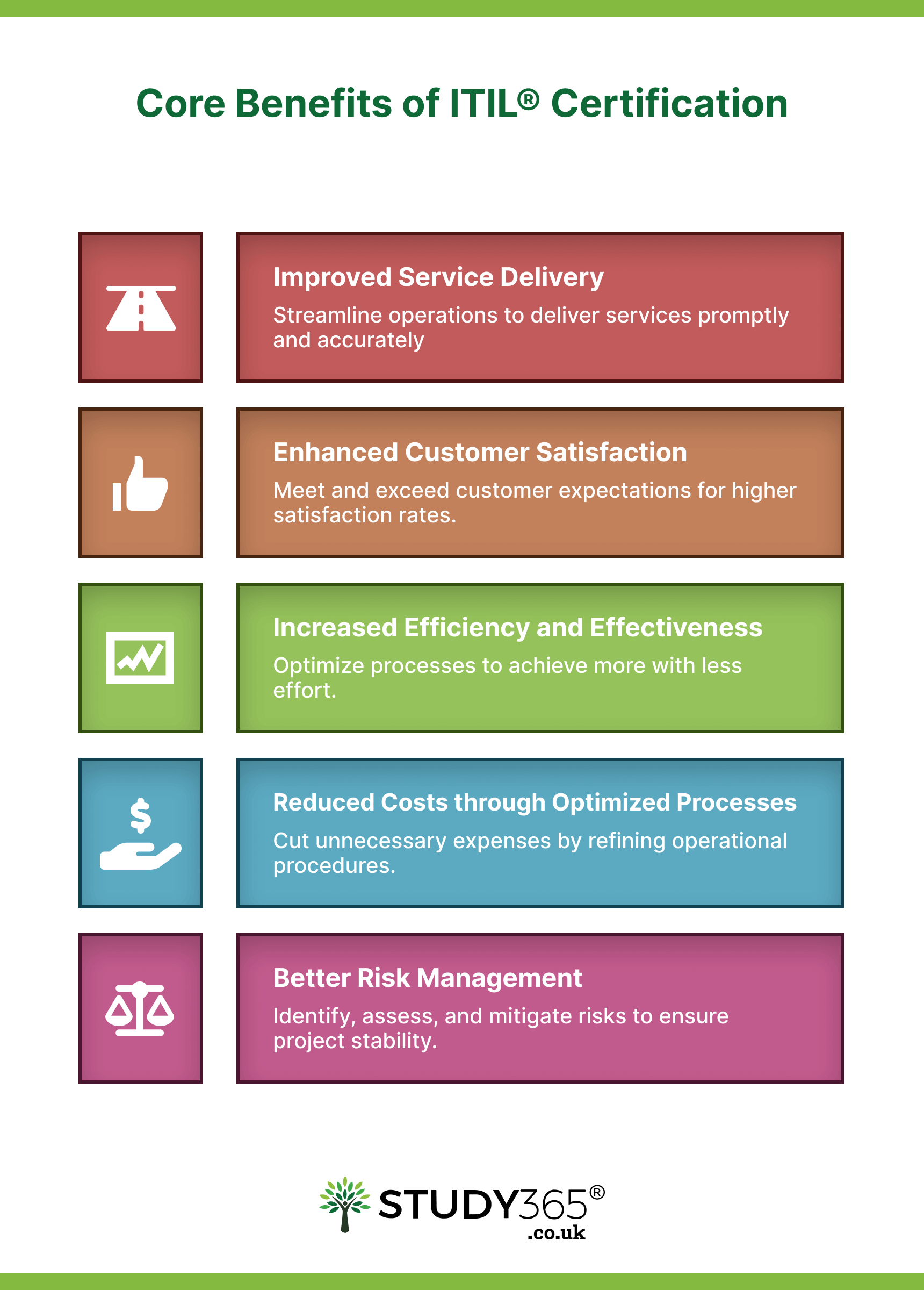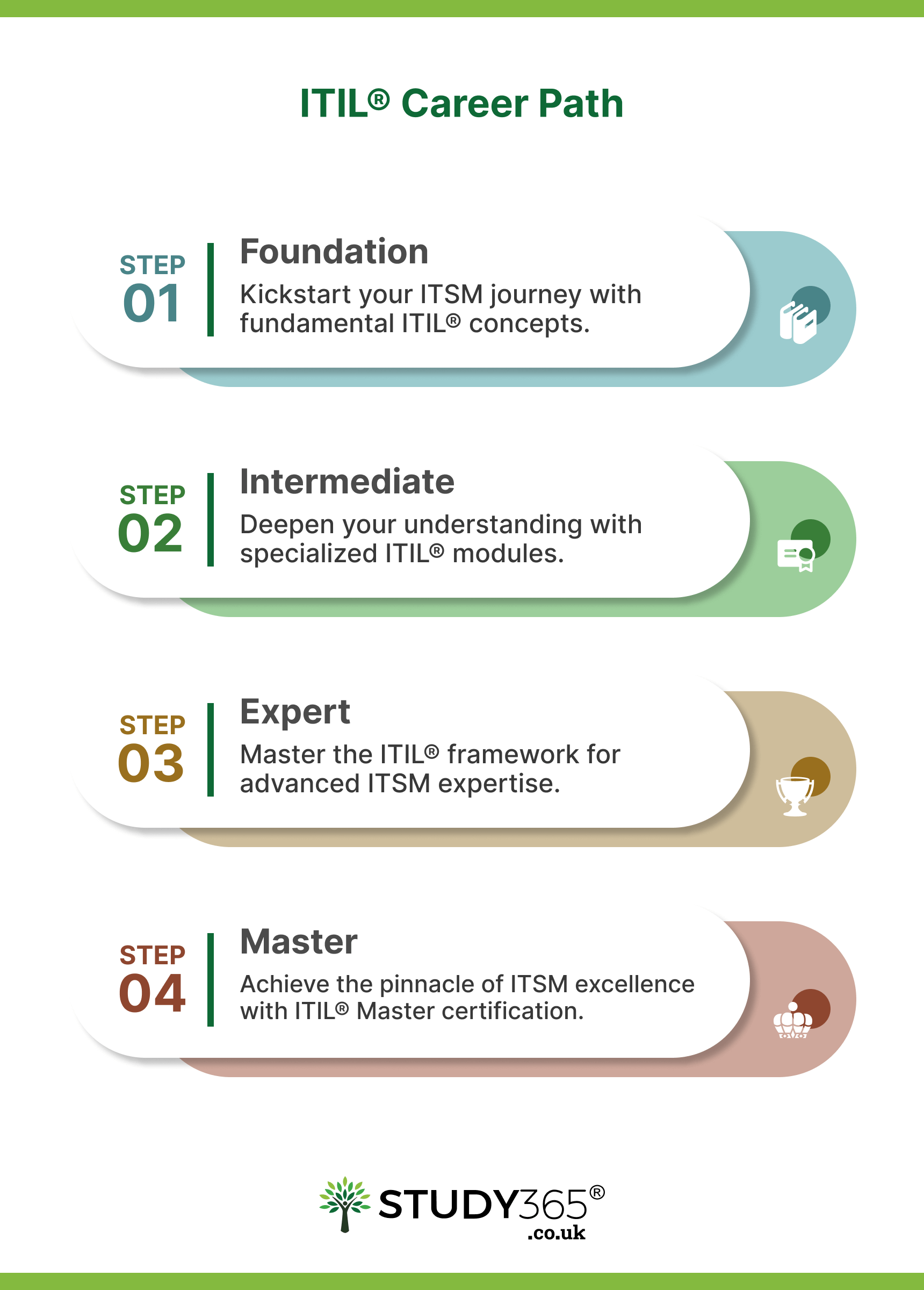ITIL® Project Management 101

A look at ITIL® in the field of Project Management:
ITIL®, which stands for "Information Technology Infrastructure Library," is a set of rules and best practises for running and offering IT services. The UK government made ITIL in the 1980s, and now people all over the world use it for IT service management (ITSM). ITIL® ideas have made their way into project management over the past few years as businesses try to make their IT projects run more smoothly and quickly.
Core principles of ITIL®
There are a lot of processes and best practises that make up ITIL®. These cover every part of an IT service. It has five main parts, or articles, that each talk about a different aspect of IT service management:
- Service strategy: Business owners can check that their IT services are in line with their other business goals in this step. It means making a plan for how to use IT services to help people.
- Service design: This is where the main goal is to make IT services that meet the needs of both the company and its clients. Things like service levels, architectures, and methods are set in this step.
- Service change: Running and setting up IT services is the main goal of the change phase. You have to test, deploy, and share information to make sure that changes to services go easily.
- Service operation: Every day, IT services are handled and sent out in this step. It means taking care of events and problems and always finding ways to make things better to keep the service level high.
- CSI stands for: "Continuous Service Improvement." ITIL® urges people to always be looking for ways to make things better by regularly reviewing and improving IT services and processes. Businesses can keep up with new technology and change with the times with the help of CSI.
Relevance in today's IT landscape
ITIL® is still very important in the IT world of today:
- Alignment with business goals: ITIL®'s attention on making sure that IT services are in line with business goals is very important now that IT is so important to business success. For the company, it makes sure that IT work helps them reach their goals.
- Efficiency and quality: Standardised and efficient processes are emphasised by ITIL® to lower the chance of service breakdowns and improve the quality of service. You need to be able to count on your IT services in today's market.
- Giving way to new technologies: ITIL® was born out of traditional IT, but it has grown over the years to include new technologies such as automation, cloud computing, and DevOps. The adaptability of ITIL® means that it can be used to handle current IT systems.
- Acceptance all over the world: ITIL® is known and used all over the world. It is easier for IT experts, vendors, and businesses to work on projects and efforts together because they all use the same framework.
- Compliance and security: Every day, IT services are handled and sent out in this step. It means taking care of events and problems and always finding ways to make things better to keep the service level high.

ITIL®'s history and how it's changed over time
Where ITIL® originated
"Information Technology Infrastructure Library," or ITIL®, got its start in
the 1980s in the UK government. Companies needed better ways to handle their IT services as they
became more reliant on IT to run. This task was given to the Central Computer and
Telecommunications Agency (CCTA), which is now known as the UK Government Digital Service (GDS).
Their job was to figure out how to do it.
The first thing the CCTA wanted to do was write down and standardise the good IT practices and
steps that different government departments were using. Everyone in the government had to be
able to use the same IT service management (ITSM) language and method. This work led to the
creation of what we now call ITIL®.
Progress over time:
As a start, ITIL® was made up of books and papers that showed how to do
different parts of IT service management in the best way.
Service Strategy, Service Design, Service Transition, Service Operation, and Continual Service
Improvement were some of the steps that these practises went through. Each part talked about how
to plan, create, build, run, and keep improving IT services.
Development over the years:
A lot of changes have been made to ITIL® over the years to keep up with new technology and changes in how business is done. These are some of the most important events in the history of ITIL®:
- ITIL Version 2 (from the 2000s):
- The 2007 "ITIL Version 3":
- ITIL 2011:
- ITIL® 4 (2019):
This was a big change to the framework because it added more detailed steps and ways of doing things. It was used by many people all over the world and is now the standard for ITSM.
The idea of the IT service lifecycle was added in this update, which was called ITIL v3. It stressed how important it is to have a plan for the service, its design, its transition, its operation, and its growth. It also brought in a plan that was more focused on business and all-around it.
This made ITIL v3 better by fixing mistakes and making things more clear. Most of the main ideas stayed the same.
It was a big change called ITIL® 4 that was meant to bring the system up to date. It made the Service Value System (SVS) to show how important IT services are to business and digital change as a whole. ITIL® 4 also includes more up-to-date methods, such as Agile, DevOps, and Lean.
As ITIL® has grown, it has changed to keep up with new technologies like
hacking, the cloud, and automation. Also, customer-centricity and adaptability are built in.
This shows how business and IT are changing.
ITIL® is no longer just a framework for IT teams. It's also a set of best practices that
businesses in all fields use to make sure their services run smoothly. ITIL® is still useful for
businesses that want to offer dependable and useful IT services even though technology is always
changing. This is because ITIL® is adaptable and simple to modify.
Importance of ITIL® for Project Managers

Project Managers with ITIL® qualification have a good opportunity of shining in the industry. This is a great reason for project managers to learn about ITIL®. These are some of them:
- Enhanced project success:
- Stress being quick
- Following business goals
- Controlling risks
- How to move up in your job:
- Better collaboration:
- Holistic understanding:
- Risk management that works:
- Streamlined change management:
- Optimized service transition:
- Quality assurance:
Projects should stick to ITIL®'s best practises, which:
To get ahead at work, you need to know how to use ITIL® as a project manager. As more companies start to use it, we need more people who know how to do this. It is possible to get new jobs and make more money by getting qualified in ITIL®.
ITIL® tells IT and other parts of the business to work together more. IT and business teams can work together and talk to each other better if the project manager knows ITIL®.
Around the world ITIL® helps project managers understand how IT service management works in a broader sense. This helps them choose what's best for the business and the projects.
ITIL®'s risk management practises help project managers find risks, rate them, and lower them.
ITIL®'s methods for change management can help project managers make sure that changes to projects go off without a hitch.
When project managers use ITIL®, they can make it easier for project goods to be used in real life with as little trouble as possible.
ITIL® focuses on service quality and progress all the time, which helps project managers keep an eye on product quality and improve products.

An overview of the levels of certification
There are different stages in the certification process, and each one builds on the one before it. Here is a list of all the levels of certification:
- ITIL® 4 Foundation
- Ideas
- Principles
- Terms
- ITIL® Practitioner:
- ITIL® Intermediate:
- Service Lifecycle
- Service Capability
- Service Offerings
- Agreements
- Release
- Control
- Validation
- ITIL® Managing Professional (MP):
- ITIL Specialist Create, Deliver, and Support
- ITIL Specialist Drive Stakeholder Value
- ITIL Specialist High-Velocity IT
- ITIL Strategist Direct, Plan, and Improve
- ITIL Strategic Leader (SL):
- ITIL Master:
This is the first level of qualification in ITIL®. It teaches you the basic:
It's good for project managers who want to learn the basics of IT service management.
At this level, you'll learn how to use ITIL® concepts in the real world. It shows project managers how to use ITIL® models to make things run more smoothly and get better results.
There are two tracks at the Intermediate level:
You can choose either stream if you want to be a project manager. The Service Lifecycle stream is about handling IT services over the course of their entire lifecycle. The Service Capability stream, on the other hand, goes into more detail about specific ITIL processes like:
This certification level is designed for project managers who want to demonstrate their expertise in ITIL®. It is comprised of four modules:
This level of education is all about business strategy and leadership.
ITIL® Master is the highest level of ITIL® certification. It is only given to professionals with a lot of experience who have really mastered ITIL® ideas and can use them in difficult real-life situations. To get to this level, you have to present a detailed plan and defend it well in front of a review panel.
Predicted trends and changes in the field
Using both Agile and DevOps together:
Combining Agile and DevOps methods is a big trend in project management. ITIL® is likely to change by giving advice on how to add these methods to IT service management without any problems. By doing this, companies will be able to offer IT services more quickly while still maintaining high standards.
Focus on automation and AI:
The future of ITIL® may focus on automating routine chores and using Artificial Intelligence (AI) for predictive analytics. This will help project managers spot problems before they get worse, which will allow them to solve problems more proactively.
Greater emphasis on customer experience:
Project management is becoming more and more focused on the customer. ITIL® could change to put more emphasis on making the customer experience better by adding ways for customers to give feedback and service design principles.
Hybrid and multi-cloud environments:
As mixed and multiple cloud environments become more common, project managers will need help handling services that run on multiple platforms. ITIL® could give best practices for making sure that services are delivered smoothly in these complicated settings.
Security and compliance:
As online threats continue to grow, ITIL® may add more detailed security and compliance rules to help project managers keep IT services and data safe.
Working from home and being spread out:
The COVID-19 outbreak sped up the move towards working from home. ITIL® could help with the problems of handling IT services for a workforce that works from home or in different places by focusing on:
- Communication
- Collaboration tools
- Delivering services remotely

Common critiques of ITIL®
- Complexity and overhead: ITIL® can be hard to understand and follow, especially for small groups or projects. Some say that the extra work that ITIL® processes add can make businesses less flexible and project completion times longer.
- One-size-fits-all approach: Some people say that ITIL® is too specific and doesn't take into account how each project or company is unique and what its needs are. Thoughts on ITIL®? Some people believe it might not work for all projects, big or small.
- Lack of will to change: Putting ITIL® into place often requires a big shift in how a business runs. When employees and other important people don't want to change, it can be tough.
- Costs: The costs of putting ITIL® into place can be high, as training, tools, and changing the way things are done all cost money. A lot of small groups may have trouble with their funds.
- Lack of focus on innovation: Some people say that ITIL®'s focus on standards and security can slow down new ideas and not keep up with how quickly technologies change.
In conclusion;
In the fast-paced world of IT and project management, it's
important to keep learning and improving your skills. You can easily go beyond the basic ITIL®
certification with Study365. You can choose from a wide range of advanced courses that are
tailored to your work goals. Study365 gives you a complete way to learn IT service management,
from ITIL® Practitioner to ITIL® Master.
Study365 is here to give you the maximum knowledge. Enter into an ITIL® course with us.
You will
reap benefits in your career. Contact us.
Get more qualifications with Study365!
You can learn more and get better at a lot more things on Study365 than just ITIL®. Some examples are:
- Project Management:
- PRINCE2®
- PMP
- Agile
- Scrum
- Data Science and Analytics:
- Data science
- Machine learning
- Data analytics
- Leadership and Management:
Study365 can help you learn project management skills like:
So, you can get a better job and be a better project manager.
To learn how to use data to find something useful, you can take classes at Study365 in:
You should take classes in leadership and management as well as "soft skills" that are needed for job growth if you want to get better at them.

FAQs
Related Products
>Leave a Message
Leave a Message
YOUR EMAIL ADDRESS WILL NOT BE PUBLISHED. REQUIRED FIELDS ARE MARKED.

